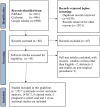Management of preoperative anxiety with non-pharmacological methods in pediatric patients in resource-limited settings: a literature review
- PMID: 40110318
- PMCID: PMC11918547
- DOI: 10.1097/MS9.0000000000002912
Management of preoperative anxiety with non-pharmacological methods in pediatric patients in resource-limited settings: a literature review
Abstract
Background: Anxiety disorders are common in children and among the most prevalent psychiatric issues. Untreated preoperative anxiety can lead to increased complications and a higher risk for future anxiety disorders and major depression. Therefore, addressing preoperative anxiety in children is crucial to prevent perioperative and long-term adverse effects.
Objective: This review aimed to evaluate various articles and develop a management plan based on evidence for the prevention of preoperative anxiety in children using non-pharmacological approaches in areas with limited resources.
Methods: This systematic review was conducted according to the Preferred Reporting Items for Systematic Reviews and Meta-Analyses (PRISMA) protocol. Databases, such as PubMed, Cochrane Library, and Google Scholar, were searched for high-quality evidence to draw appropriate conclusions.
Result: A total of 7669 articles were retrieved from the search engines. These articles were then filtered based on intervention, outcome, population data, inclusion and exclusion criteria, and methodological quality. After the filtration process, only 35 studies met the inclusion criteria for comprehensive review.
Conclusion: The Children's Emotional Manifestation Scale (CEMS) effectively assesses preoperative anxiety in children. Evidence suggests that non-pharmacological interventions such as clowning, music therapy, audiovisuals, virtual reality, and cognitive-behavioral therapy are effective in preventing preoperative anxiety. Practitioners can choose a suitable non-pharmacological approach based on availability and cost.
Keywords: audiovisual; clowning; music therapy; pediatric surgery; preoperative anxiety; virtual reality.
Copyright © 2025 The Author(s). Published by Wolters Kluwer Health, Inc.
Conflict of interest statement
The authors declare no potential conflicts of interest with respect to the research, authorship, or publication of this article.
Figures
Similar articles
-
Beyond the black stump: rapid reviews of health research issues affecting regional, rural and remote Australia.Med J Aust. 2020 Dec;213 Suppl 11:S3-S32.e1. doi: 10.5694/mja2.50881. Med J Aust. 2020. PMID: 33314144
-
The Role of Preoperative Virtual Reality for Anxiety Reduction in Pediatric Surgical Patients: A Systematic Review and Meta-Analysis.Cureus. 2025 Jan 7;17(1):e77077. doi: 10.7759/cureus.77077. eCollection 2025 Jan. Cureus. 2025. PMID: 39917152 Free PMC article. Review.
-
The future of Cochrane Neonatal.Early Hum Dev. 2020 Nov;150:105191. doi: 10.1016/j.earlhumdev.2020.105191. Epub 2020 Sep 12. Early Hum Dev. 2020. PMID: 33036834
-
Behavioural modification interventions for medically unexplained symptoms in primary care: systematic reviews and economic evaluation.Health Technol Assess. 2020 Sep;24(46):1-490. doi: 10.3310/hta24460. Health Technol Assess. 2020. PMID: 32975190 Free PMC article.
-
Deployment of personnel to military operations: impact on mental health and social functioning.Campbell Syst Rev. 2018 Jun 1;14(1):1-127. doi: 10.4073/csr.2018.6. eCollection 2018. Campbell Syst Rev. 2018. PMID: 37131363 Free PMC article.
Cited by
-
Comparing Pharmacological and Nonpharmacological Interventions for Alleviating Preoperative Anxiety in Pediatric Surgical Patients: A Randomized Controlled Trial in Pakistan.Cureus. 2025 Apr 18;17(4):e82502. doi: 10.7759/cureus.82502. eCollection 2025 Apr. Cureus. 2025. PMID: 40385813 Free PMC article.
References
-
- Topcu SY, Kostak MA, Semerci R, et al. . Effect of gum chewing on pain and anxiety in Turkish children during intravenous cannulation: a randomized controlled study. J Pediatr Nurs 2020;52:e26–32. - PubMed
-
- Bittner A, Egger HL, Erkanli A, et al. . What do childhood anxiety disorders predict? J Child Psychol Psychiatry 2007;48:1174–83. - PubMed
-
- Compton WM, Thomas YF, Stinson FS, et al. . Prevalence, correlates, disability, and comorbidity of DSM-IV drug abuse and dependence in the United States: results from the national epidemiologic survey on alcohol and related conditions. Arch Gen Psychiatry 2007;64:566–76. - PubMed
Publication types
LinkOut - more resources
Full Text Sources
Miscellaneous


